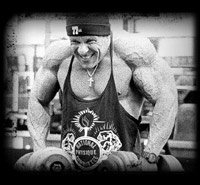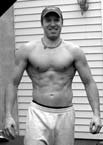
Training Keys


A key to your training success is high intensity muscular contractions. The higher the intensity you are able to generate, the greater the stimulation for muscle growth.
To build muscle optimally and efficiently, you need to progressively and continually increase the degree of intensity that you expose your muscles to.
The higher the level of intensity you are able to generate in a workout, the shorter the workout must be. You can train hard or you can train long, but you can't do both. They are mutually exclusive endeavors. If you haven't seen that sentence before, read it again and again until it not only sinks in, but sinks in with complete understanding. Heck, even if you have read it before, go read it again.
That sentence should be in everything you read on the topic of resistance training programs. Its importance can't be overstated.
Let's use running as an example. You can not sprint (a maximum intensity anaerobic effort) for a mile. The longer the distance (duration), the lower the level of intensity. You can't sprint a marathon. Instead you rely on your aerobic energy system, which is an energy system used for low to moderate intensities requiring the presence of oxygen.
However, if you sprint, you'll tax your anaerobic energy system (not requiring oxygen, due to a very short time period of effort). By definition, the aerobic and anaerobic energy systems are mutually exclusive.
In our 'more is better' society, many people confuse the concept of intensity with that of duration, or volume. I'm sure you've heard people talk about how hard someone works out and then they tell you he or she works out 2 hours a day. But that's not a hard workout, that's a long workout, and the two are mutually exclusive. Aerobically, it may be a "hard" workout, but not for building muscle.
Besides intensity, duration is the other component of an individual workout. While intensity is a measure of how hard you work at a given time, or the effort you give to each individual set or rep, duration is the overall length or volume of the workout itself.
Training intensity and training duration are diametrically opposed. The greater one component is, the lesser the other must be. The higher your intensity, the shorter the training session must be.
The balance between intensity, duration and frequency will be out of wack and you won't know where to go next, unless you understand these principles and how they interact with one another.
If you don't train with 100% intensity you will not know if you worked out hard enough to trigger the adaptation that leads to muscle growth. Your progress will be hit and miss, a far cry from the optimal training program that we are looking for.
In addition, if you don't train with 100% intensity, you will not be able to make accurate adjustments to your training duration and frequency in order to continually progress.

Why Is This?

With resistance training, your intensity level is directly related to the amount of muscular fatigue that is produced. The only two levels that can be currently measured are 0% intensity and 100% intensity.
Maybe it does take less than 100% intensity to trigger the adaptive response mechanism. Maybe it takes only 90%. Again, the problem with this is that we don't know and we can't measure it.
To continually make progress, we need to find ways to increase our intensity levels, while reducing the duration of our workouts and the frequency of those workouts so our body can recover and adapt before the next workout.

How To Continuously Make Gains...

 In order to continue to make progress, you must find ways to increase the intensity of your exercise, while reducing both the duration of the exercise and the frequency so that your body has time to adapt to the increases stress placed upon it.
In order to continue to make progress, you must find ways to increase the intensity of your exercise, while reducing both the duration of the exercise and the frequency so that your body has time to adapt to the increases stress placed upon it.
Continue to find ways to make your exercise harder and briefer so that your body will be continually forced to adapt. Work out less often so that your body can recover.
Your body does not want to change. And once it gets used to the intensity level of your workout, it will stop adapting until you generate a higher level of intensity beyond what it is used to doing.
Building Muscle & Burning Fat!
Thanks,
